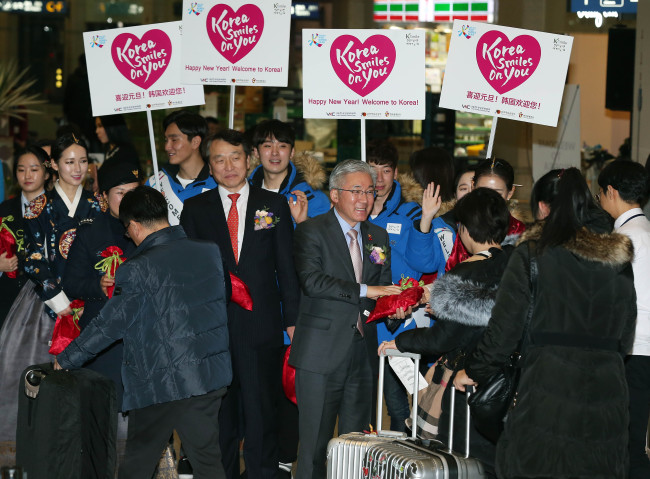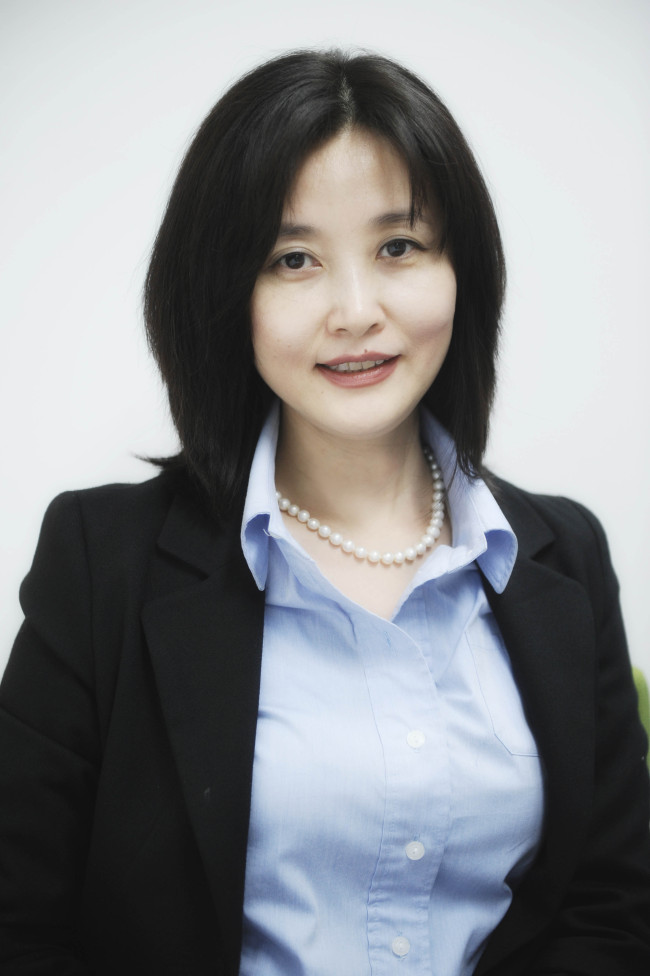At 25 minutes past midnight on Jan. 1, government officials and corporate executives welcomed the country’s first foreign tourists of the year at Incheon International Airport.
Gifts including cosmetics kits and beverages were handed out to inbound travelers, with officials wishing them “Happy New Year” while holding placards that read “Korea Smiles on You.”
Over the next two years until the 2018 Winter Olympics in PyeongChang, Gangwon Province, Korea will hold a series of grand promotional campaigns such as “K-Smile” at home and abroad to promote the country as one of the world’s top travel destinations, a country with beautiful nature and one that offers friendly, comfortable and good service.
Under the vision of “The World Keeps Coming Back to Korea,” the Visit Korea Committee and its partners seek to attract more than 20 million foreign tourists to Korea by 2017. The committee, headed by chairman Park Sam-koo, is a nonprofit organization that works closely with the public and private sectors, including the Ministry of Culture, Sports and Tourism, the Korea Tourism Organization and regional governments, to promote Korean tourism. Park is also the chairman of Kumho Asiana Group.
 |
Culture Minister Kim Jong-deok (center) greets foreign arrivals of the year at Incheon International Aiport on Jan. 1. (Culture Ministry) |
But Han Kyung-ah, secretary-general of the Visit Korea Committee, said this time, the Visit Korea Year has to be more than just about number of foreign guests traveling to Korea.
In line with its K-Smile promotions, “Visit Korea Year 2016-2018” aims to boost the sustainability of Korean tourism by improving the quality of the country’s hospitality services and eradicating, once and for all, malpractices of ripping off or being inattentive to travelers or customers, Han said.
“Our long-term vision is creating a virtuous circle enabling tourists to ‘visit, revisit and experience and re-experience’ with their families and friends the beautiful nature and provinces of Korea comfortably,” said Han in an interview Thursday at her office in Insa-dong, Seoul.
“It would be useless should Visit Korea Year become a one-time thing and be unable to compel tourists to come back after the 2018 Winter Olympics is over. This would not be sustainable.”
In addition to launching the K-Smile campaign, the Visit Korea Committee has launched “K-Travel” bus operations for foreign tourists to visit countryside areas such as Sinan, South Jeolla Province, which is difficult to travel to due to lacking infrastructure.
The committee will also hold the “Korea Grand Sale” shopping festival in November this year.
“We ultimately want to create momentum for the PyeongChang Olympics and, at the same time, improve the tourism infrastructure, enabling foreigners to travel to regional places independently like we do when traveling in the U.S. or Europe with smartphone applications,” Han said.
 |
Han Kyung-ah, secretary general of the Visit Korea Committee (VKC) |
However, Han knows that attracting foreign tourists will not be easy, as Korea faces tough competition from Japan and China, which are also aggressively promoting tourism ahead of the 2020 Tokyo Summer Olympics and the 2022 Beijing Winter Olympics, respectively
While Korea attracted some 13 million tourists in 2015, the Visit Korea Committee said it saw many tourists, including Chinese, rerouting to Japan following the Shinzo Abe government’s strengthened tourism policy and goal of attracting 20 million foreign tourists by 2020 by relaxing visa regulations and increasing infrastructure with multilingual services.
“This is the first time where the three Northeast Asian countries are simultaneously vying to win the hearts of tourists using the Olympics, which will be held every two years beginning with PyeongChang in 2018, Tokyo in 2020, then Beijing in 2022,” Han said.
“But the major difference is that Korea is the only one to be hosting the global sports gala in the countryside. We will be mostly focusing on promoting the country’s regional travel destinations that are still relatively unknown even among locals.”
Korea previously launched the “Visit Korea Year” in 2010-2012, attracting some 10 million tourists, thanks to the popularity of K-pop music overseas.
“Visit Korea 2010-2012 helped Korea become a well-known travel destination. This time, we seek to become an economy with advanced tourism infrastructure through high-quality, friendly services,” Han said.
By Park Hyong-ki (
hkp@heraldcorp.com)







![[Exclusive] Hyundai Mobis eyes closer ties with BYD](http://res.heraldm.com/phpwas/restmb_idxmake.php?idx=644&simg=/content/image/2024/11/25/20241125050044_0.jpg)
![[Herald Review] 'Gangnam B-Side' combines social realism with masterful suspense, performance](http://res.heraldm.com/phpwas/restmb_idxmake.php?idx=644&simg=/content/image/2024/11/25/20241125050072_0.jpg)
